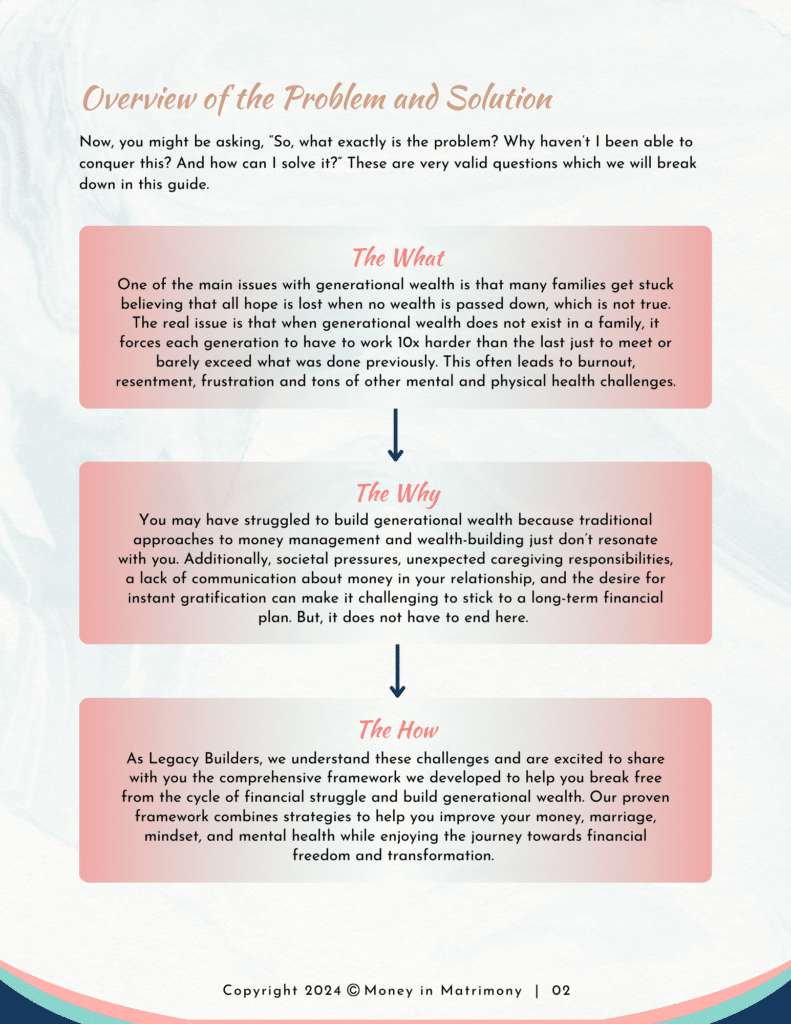How to Play an Equal Role in Marriage When There is Financial Inequality
This post may contain affiliate links which means that I will receive a small commission for purchases made through those links, at no cost to you.

What is financial inequality?
When one spouse earns significantly more than the other spouse, society often refers to the higher income earner as the breadwinner. This is what financial inequality or an income gap looks like within a marriage.
In order to help combat the feelings associated with financial inequality, listed below are seven ways you and your spouse can play an equal role in marriage as it relates to your finances.
1. Communicate
2. Create a clear vision
3. Budget together
4. Combine finances
5. Split household chores
6. Share power
7. Act as one unit
History
In past years, women would stay home to take care of the children while men would work outside of the home. This automatically categorized the man as the higher income earner. Today, more and more women are working outside of the home. Despite some women bringing in higher incomes than their husbands, women still don’t feel financially equal in the marriage.
According to a recent article published on Census.Gov, “When wives earn more than their husbands do, a puzzling thing can happen. Husbands say that they actually earn more than they do and wives under-report their income.” This is because the wife wants to portray their husbands as the breadwinners. However; there is still over 60% of husbands bringing home more income than their wives, per a study done by the Pew Research Center.

indicators
Financial inequality within marriage can make one or both spouses pull away from each other. Some of these reasons might be due to guilt, resentment, stress, feelings of inadequacy, struggle for power, financial infidelity or a combination of several of these items. In order to prevent some of these issues, let’s take a deeper dive into the list above.
1. Communicate
Be willing to have an honest discussion with your spouse. Let him/her know how you feel. Open up about your struggles. If you have feelings of guilt or resentment, tell your spouse about it. Don’t hold anything back. Be vulnerable. The importance of communicating with your spouse is to improve the current situation.
2. Create a clear vision
Write your financial goals down along with a detailed action plan to describe how you will reach your goals using the S.M.A.R.T goals technique. You want to ensure that you and your spouse are on the same page as it relates to long and short term goals. Each partner should also create a separate list of personal goals, in addition to the combined list of family goals. Just because you are married does not mean that you should diminish your own individual dreams and goals. If you want more of a visual to help you in this area, refer to the following post: Married Couples Should Follow These Simple Steps to Catapult Their Financial Goals.
3. Budget together
Each month, before the money comes in, set aside time to have a budget meeting with your spouse. Create a budget that both partners can agree on. Find some middle ground on items that you disagree on. Make adjustments for holidays, birthdays, and other variable or one-off type expenses that may not have been accounted for previously.
4. Combine finances
When finances are combined, both partners share the responsibility of knowing the ins and outs of the household finances. This includes knowing passwords, account numbers, payment due dates, etc. This keeps both partners informed of what will happen on a monthly basis. In addition, time will be saved on budgeting, transparency and trust will be built, and a sense of family devotion will be created. In one of my recent posts, I went into depth about how important it was for married couples to combine finances. You can find it here: 4 of the Best Reasons Married Couples Should Share Finances.
5. Split household chores
When both partners partake in the household chores, this puts everyone on the same playing field, regardless of income. Utilizing this technique ensures that neither spouse is put on a pedestal because the finances, chores and other responsibilities are shared equally. Developing a schedule of what and when chores need to be done will be essential. It will also be especially helpful if this is a new idea being introduced into your household for the first time.
Now, here’s the thing. Depending on the dynamics of your household, dividing these chores might not lead to an equal 50/50 split. It might be 60/40 or 70/30. This can also become especially tricky when both spouses are working outside of the home 40+ hours per week. However; the spouse earning the least amount of income should not be penalized just because they are bringing in less. Both partners will need to sit down and assess their situation. The ultimate goal is to work as a team and be equal partners within the marriage.
6. Share power
No one person within the marriage should be making all of the financial decisions in the household. Of course, there are exceptions which are not limited to one spouse being gravely ill or other extenuating circumstances. If the latter does not apply, both partners should have equal authority and decision-making power within the marriage. In addition, both partners should also have equal spending and purchasing power, which should have been addressed when items 1-4 above were discussed.
7. Act as one unit
When you and your spouse tied the knot, you became one. Each partner has to get rid of the “me,” “my” and “mine” mentality as it relates to finances. This might mean that one or both partners will end up compromising on certain things. It’s important to learn to work as a team so that goals can get accomplished.

seek professional help
If you and your spouse have taken the actions above, and your situation has not improved, then you may want to seek professional help! Sources such as financial therapists, financial coaches, and financial counselors can help you get to the root of the problem. However; please do your research and seek references before you decide to work with one of these professionals.
Financial Abuse
In certain situations, financial inequality can lead to financial abuse. This occurs when one partner has full control over all aspects of the finances and places heavy restrictions on what the victim can do with the finances provided to them. Unfortunately, this is an unhealthy situation, because typically where there is financial abuse, there also lies some form of other abuse. This is why it’s so important to follow the steps above so that both partners are equal as it relates to household finances. If you, or someone you know are being financially manipulated by a spouse or anyone for that matter, then please contact The National Domestic Violence Hotline at 1-800-799-SAFE.
Take action
Financial inequality is a very sensitive topic for obvious reasons. Most people tend to keep finances private especially within marriage. When financial inequality exists within marriage, one spouse may bury their feelings of inadequacy or shut down altogether. In order to play an equal role within the marriage, spouses should take the following actions: 1. Communicate 2. Create a Clear Vision 3. Budget Together 4. Combine Finances 5. Split Household Chores 6. Share Power and 7. Act as One Unit. It might take several tries in order to get it right, but the situation will not improve until action is taken!








